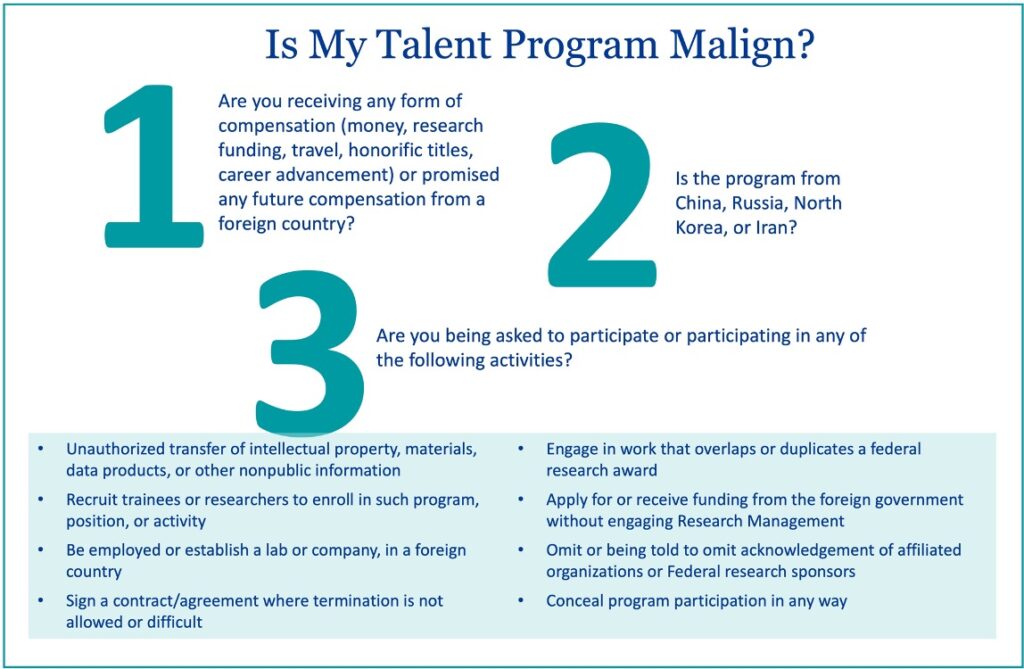FOREIGN TALENT RECRUITMENT PROGRAMS
Foreign Talent Recruitment Programs (FTRP) are initiatives organized, managed, or funded by foreign governments, whether directly or indirectly, to recruit faculty, professionals and students in targeted science and technology disciplines. While many countries sponsor legitimate and mutually beneficial FTRP, some may include requirements or incentivize activities that create conflicts of interest/commitment or are unethical or illegal. These types of programs are considered “malign” foreign talent programs. Participation in malign foreign talent programs is prohibited by federal sponsors for Senior/Key Personnel.
As defined by the Office of Science and Technology Policy foreign talent recruitment program is any program, position, or activity that includes compensation in the form of cash, in-kind compensation, including research funding, promised future compensation, complimentary foreign travel, things of non de minimis value, honorific titles, career advancement opportunities, or other types of remuneration or consideration directly provided by a foreign country at any level (national, provincial, or local) or their designee, or an entity based in, funded by, or affiliated with a foreign country, whether or not directly sponsored by the foreign country, to an individual, whether directly or indirectly stated in the arrangement, contract, or other documentation at issue.
Excludes the following international collaboration activities, so long as the activity is not funded, organized, or managed by an academic institution or a foreign talent recruitment program on the lists developed under paragraphs (8) and (9) of Section 1286(c) in NDAA FY 2019:
- Making scholarly presentations and publishing written materials regarding scientific information not otherwise controlled under current law;
- Participating in international conferences or other international exchanges, research projects or programs that involve open and reciprocal exchange of scientific information, and which are aimed at advancing international scientific understanding and not otherwise controlled under current law;
- Advising a foreign student enrolled at an institution of higher education or writing a recommendation for such a student, at such student’s request; and
- Engaging in the following international activities:
- Activities that are partly sponsored or otherwise supported by the United States such as serving as a government appointee to the board of a joint scientific fund (e.g., the U.S.- Israel Binational Industrial Research and Development Foundation); providing advice to or otherwise participating in international technical organizations, multilateral scientific organizations, and standards setting bodies (e.g., the International Telecommunications Union, Intergovernmental Panel on Climate Change, etc.); participating in a Fulbright Commission program funded in whole or in part by a host country government; or other routine international scientific exchanges and interactions such as providing invited lectures or participating in international peer review panels.
- Involvement in national or international academies or professional societies that produce publications in the open scientific literature that are not in conflict with the interests of the federal research agency (e.g., membership in the Pontifical Academy of Sciences or The Royal Society).
- Taking a sabbatical, serving as a visiting scholar, or engaging in continuing education activities such as receiving a doctorate or professional certification at an institution of higher education (e.g., the University of Oxford, McGill University) that are not in conflict with the interests of the federal research agency.
- Receiving awards for research and development which serve to enhance the prestige of the federal research agency (e.g., the Nobel Prize).
- Other international activities determined appropriate by the federal research agency head or designee.
A foreign talent program is considered “malign” if it meets BOTH criteria below:
- Sponsored by or located in a “Country of Concern” as identified by the US Government. As of January 2024, these include China, North Korea, Russian Federation, and Iran.
- Provides monetary or in-kind compensation (research funding, promised future compensation, complimentary foreign travel, honorific titles, career advancement opportunities, etc.) in exchange for participating in the following problematic activities:
- Engaging in the unauthorized transfer of intellectual property, materials, data products, or other nonpublic information
- Recruit trainees or researchers to enroll in such program, position, or activity
- Establishing a lab or company, accepting a faculty position, or undertaking any other employment or appointment in a foreign country in violation of terms and conditions of a federal research award
- Signing a contract or agreement that you are unable to terminate except in extraordinary circumstances
- Engaging in work that overlaps or duplicates a federal research award
- Applying for or receiving funding from the foreign government with the sponsoring foreign organization as the recipient
- Requirement to omit acknowledgement of affiliated organizations or Federal research sponsors
- Requirement not to disclose participation in the program to Mass General Brigham or US Federal government
- Having a conflict of interest or commitment contrary to a federal research award

The CHIPS and Science Act of 2022 prohibits participation in a Malign Foreign Talent Recruitment Program (MFTRP) by covered individuals involved in research and development awards from federal government agencies. Covered individuals are required to disclose participation in any foreign talent program, maligned or otherwise and certify that they are not party to a malign foreign talent program to receive federal fundings
DOES THIS APPLY TO ME?
Covered Individuals Mass General Brigham defines Covered Individual as an individual who:
- Contributes, in a substantive, meaningful way to the scientific development or execution of a research and development project proposed to be carried out with a research and development award from any sponsor (Federally and non-Federally funded), e.g., Senior/Key Personnel; or
- Is designated as a Covered Individual by a Federal research funding agency.
WHAT DO I NEED TO DO?
- All Covered Individuals must disclose participation in any FTRP within 30 days of the participation and in the Biographical Sketch and Current and Pending (Other Support) disclosures as part of the new Common Forms for new proposal submissions.
All Covered Individuals listed on a proposal to a sponsor must certify at the time of the proposal submittal and annually thereafter, that they are not participating in a MFTRP.
